This travel wiki page of the United Arab Emirates (UAE) will help guide travelers with quick and relevant information to consider when planning and visiting the country. It is difficult to find all the relevant information on the United Arab Emirates culture, safety, travel restrictions, and things to do, so we summarize it all here. If anything is stale or outdated, please let us know! Let’s dive in and explore more high-level information as a United Arab Emirates trip planner.
Last updated January 9th of 2024.
Table of contents
National Information & Culture
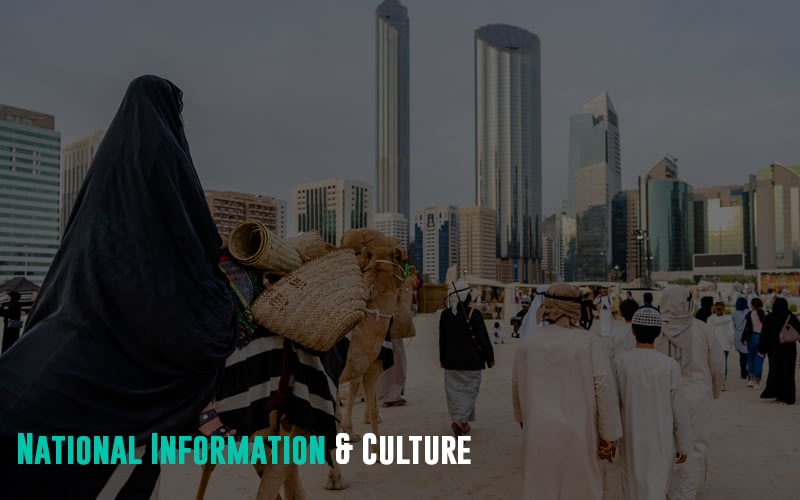
The United Arab Emirates (UAE), or simply the Emirates, is a West Asian country in the Middle East. It is a constitutional federation of seven emirates, comprising Abu Dhabi, Dubai, Fujairah, Ras Al Khaimah, Sharjah, Ajman, and Umm Al Quwain. UAE shares land borders with Oman and Saudi Arabia and maritime borders with Qatar and Iran in the Persian Gulf. Dubai is the most populous city and an international hub, but the country’s capital is Abu Dhabi, and the official currency is the Arab Emirati Dirham (AED).
The expatriate community outnumbers the population of UAE nationals, comprising less than 12% of the total. Among the country’s largest foreign community are Indians. Pakistanis, Bangladeshis, other Asians, Europeans, and Africans follow. Although Islam is the official religion, expatriates can practice their faiths under the UAE’s tolerance, co-existence, and religious inclusion policies.
A wealthy nation, the UAE has the world’s sixth and seventh-largest oil and natural gas reserves. Aside from oil and gas, the country now has a diversified economy, focusing on business and tourism.
Visit the UAE government and official tourism portals for more information and details when planning your trip.
Typical Emirati Culture
As a Muslim country, travelers to the Emirates must be aware of the local culture and etiquette for a respectful and enjoyable experience. The weekend in the UAE is Friday and Saturday, with Friday being a sacred day of prayer. Hence, respect prayer times and avoid making loud noises during these times.
UAE is a conservative country, and visitors must dress modestly, especially in public places. While Dubai and Abu Dhabi are more liberal, other emirates may have stricter dress codes. Women should cover their shoulders and knees in public areas.
Avoid public displays of affection and note that swearing and rude gestures are offensive and can lead to legal consequences. Additionally, avoid taking photos of locals without permission. Also, avoid photographing certain government buildings and military installations to avoid inconvenience. During Ramadan, refrain from eating, drinking, and smoking in public places during daylight hours.
When invited to someone’s home, bring a small gift. Use the right hand, or both hands, when giving and receiving items. Lastly, wait for the woman to extend a hand for a handshake when meeting someone.
Special Travel Considerations
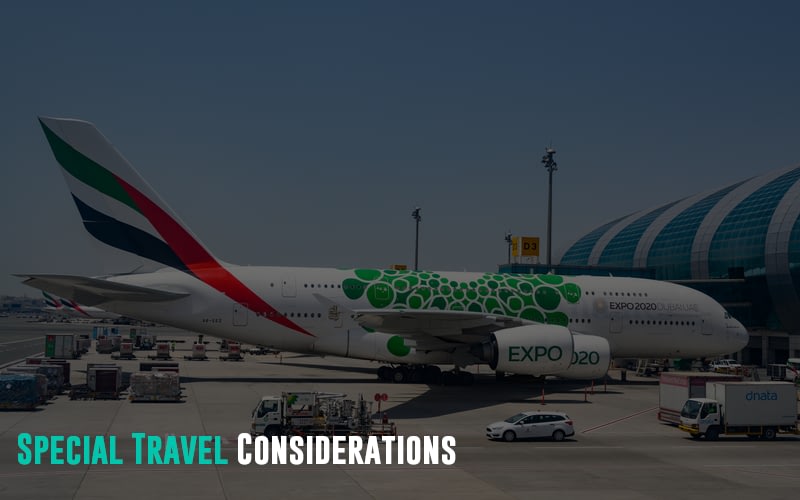
Each country and destination has rules and regulations that every traveler must consider. Hence, check the following considerations for hassle-free travel to the United Arab Emirates.
Covid-19 Policy
All visitors traveling to the United Arab Emirates no longer present a COVID‑19 vaccination certificate or perform PCR tests. However, the Covid-19 protocol may vary over time. Hence, check the Emirates’ latest updates on Covid-19 when planning your trip. Similarly, travelers can consider checking the tourism portals of Dubai and Abu Dhabi for the latest advisory.
Travel Insurance
Travel insurance is mandatory for travelers applying for a UAE tourist visa. While travel insurance is optional for other nationals, it is strongly recommended for all visitors to the Emirates. Preferably, the insurance must cover emergency medical treatment, including Covid-19, repatriation, and evacuation. Travel insurance can protect anyone against the inconvenience of injury, medical emergencies, theft, and flight cancellations. In addition, it is a comprehensive protection in case anything goes wrong with your trip.
Visa Information
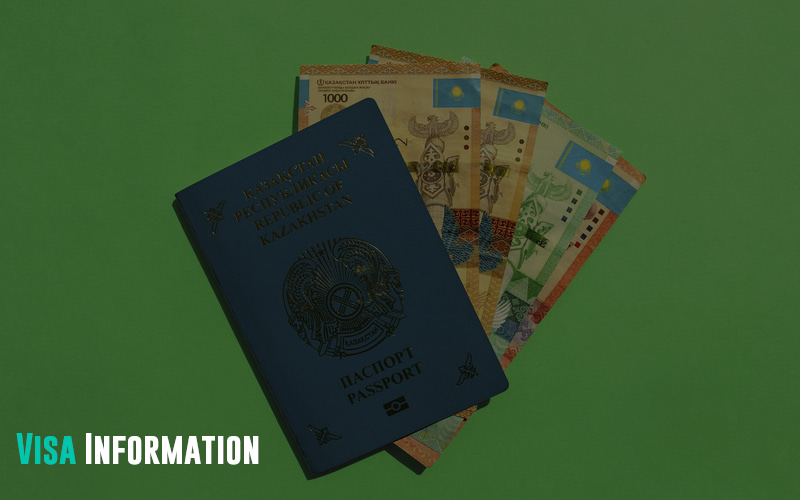
Citizens of Gulf Cooperation Council (GCC) countries, including Bahrain, Kuwait, Oman, Qatar, and Saudi Arabia, have freedom of movement to the UAE. Hence, they do not require a visa or permit to enter the Emirates. They only need to show a national identity card or a GCC country passport at entry into the UAE. Meanwhile, citizens of 79 countries do not require advance visa arrangements to enter the UAE. They can obtain a visa upon arrival from 30 to 180 days, relative to the country of their passport.
On the other hand, other nationals not on the list will require an entry permit before arrival into the UAE and someone to sponsor it. They can obtain tourist visas to the UAE with assistance from various airlines, such as Emirates, FlyDubai, Etihad Airways, and Air Arabia. Licensed travel agents and hotels in the UAE can also arrange a tourist visa for travelers. Moreover, private companies, organizations, friends, or relatives residing in the UAE can sponsor visitors and apply for a visa on their behalf.
Aside from a visa, travelers will need at least six months of a valid passport and an onward or return ticket to enter the Emirates. Visitors can also check if they need a visa to enter the Emirates from the Visit Dubai portal. It also contains more visa-related information, including visa types, requirements, and application processes.
Popular Attractions
The UAE is known for the world’s tallest buildings and luxury hotels, resorts, and malls. Emiratis are proud of their culture and heritage, and adventure enthusiasts will love the adrenaline rush on the country’s desert safaris.
Burj Khalifa
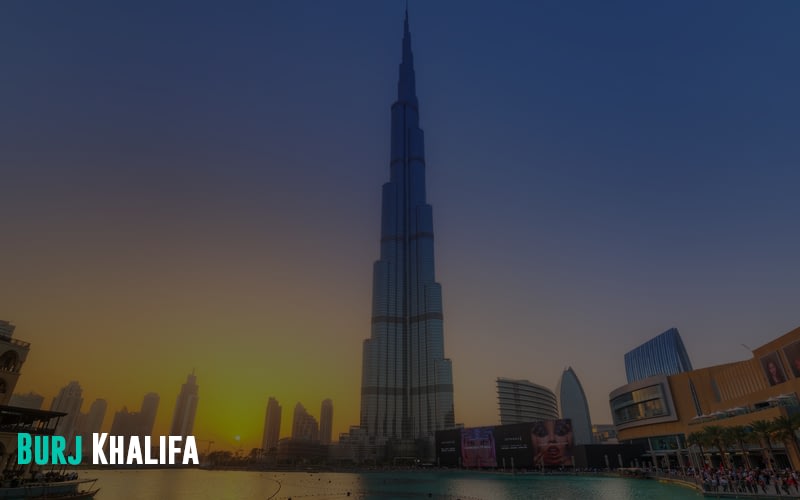
The Burj Khalifa is an iconic landmark in Dubai and the world’s tallest building at 828 meters. It also holds several records, including the tallest freestanding structure and the highest observation deck. The Burj Khalifa is an architectural marvel with two observation decks on the 124th and 148th floors and a restaurant bar on the 122nd.
Visitors often include a trip to the observation deck for panoramic views of Dubai. To enhance the visitor experience, booking tickets online up to 30 days in advance is recommended to avoid wait times. Timed tickets can be purchased at the counter, but they sell out quickly, especially during prime hours like sunset. Prices may vary based on demand and the season, and the closing times are subject to change. Plan for at least a two-hour visit, and audio guides can be rented for a more in-depth experience.
Notably, Dubai’s high humidity can affect visibility. Hence, visiting at night, especially on hazy days, is advised for better views. It’s also important to note that no refunds or rain checks are provided if the outdoor viewing terrace is closed due to bad weather.
Sheikh Zayed Mosque
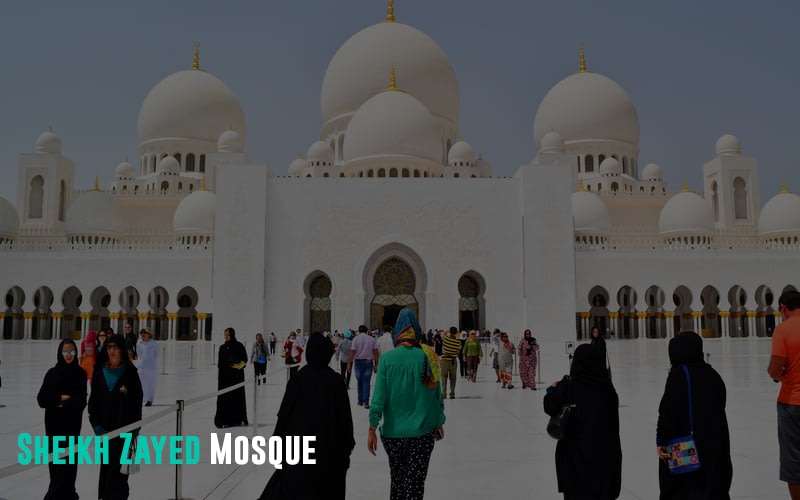
Abu Dhabi’s Sheikh Zayed Grand Mosque, envisioned by Sheikh Zayed bin Sultan Al Nahyan, is one of the world’s largest, showcasing grand design and cultural influences. It is a modern marvel, seamlessly blending contemporary design with traditional craftsmanship, incorporating gold, mosaic tiles, and glasswork. The interior boasts the world’s largest hand-knotted carpet and gold-leaf Swarovski chandeliers, while the exterior features a vast marble courtyard with a floral mosaic. A symbol of peace and co-existence, the mosque comprises 82 domes and is an architectural masterpiece combining various Islamic styles.
The mosque is a significant place where diverse individuals gather to appreciate its architectural beauty and deepen their understanding of the UAE’s culture and religion. Moreover, its open-door policy welcomes all visitors to witness its beauty and learn about Emirati culture. But remember that the mosque is an active place of worship, hosting up to 50,000 daily worshippers. So, respectful clothing is required for entry, and on Fridays, the main prayer hall is closed to visitors from 12 pm to 3 pm. Guided tours are recommended to appreciate intricate details, like gold-leaf calligraphy on the mosque’s 82 domes. When the facade lights up, a second visit during the evening is suggested, possibly combined with a trip to the Wahat Al Karama memorial and dinner in the Al Qana district.
Louvre Museum
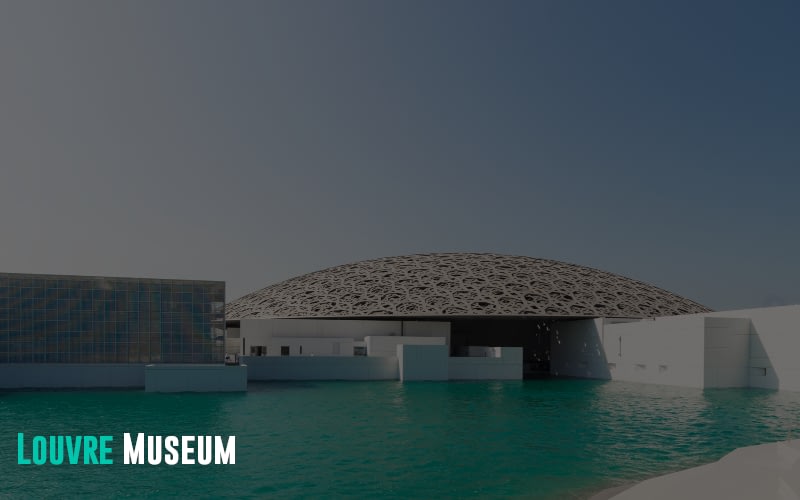
The Louvre Abu Dhabi, located in the Saadiyat Cultural District, is the first universal museum in the Arab World, providing a cultural haven that transcends geographical and historical boundaries. Designed by Pritzker-prize-winning architect Jean Nouvel, the museum showcases ancient and contemporary masterpieces.
With 9,200 square meters of galleries, the Louvre Abu Dhabi juxtaposes different civilizations, emphasizing shared human experiences. The museum’s collection spans 12 galleries where artworks are grouped thematically and chronologically, offering a global journey through human heritage. Highlights include artifacts from various cultures, such as a bronze-winged dragon from China alongside a Persian archer and a bronze lion from Spain.
The museum’s architectural masterpiece, a silvery dome weighing 7,500 tons, features a complex geometric structure with 7,850 stars. Inspired by Arabic traditions, the dome symbolizes the UAE’s ambition and achievement.
Beyond the permanent collection, separate buildings house temporary exhibitions, a children’s museum, and a museum cafe. The central plaza, shaded by the elaborate dome, extends into the sea, creating a captivating ‘rain of light’ effect as the sun passes.
Burj Al Arab
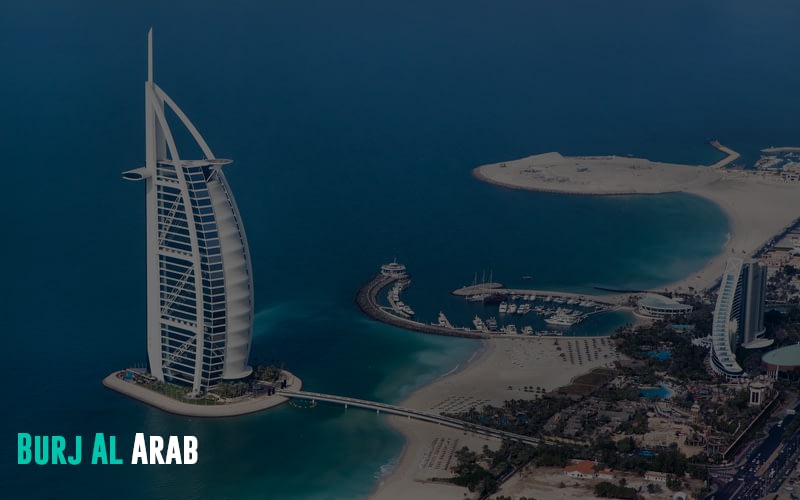
The Burj Al Arab Jumeirah is one of Dubai’s most famous landmarks, known for its ‘seven-star status’ and luxurious offerings. This sail-shaped hotel on its island has hosted VIPs and celebrities, solidifying Dubai’s position in global luxury tourism.
Distinguished by its unique architecture, the Burj Al Arab has stunning views of the Arabian Gulf and opulent interiors. The hotel’s lobby features a tall atrium with a vibrant color scheme and gold leaf accents. It has 60 floors and was the world’s tallest hotel in 1999 at 321 meters. The white metal crosspieces at the top form the most extensive cross in the Middle East, visible from the sea. Beyond its lobby, the hotel has 202 suites with lavish elements.
Among the best hotels in Dubai, Burj Al Arab features fine-dining restaurants, an underwater restaurant, and SAL with spectacular views. The hotel also boasts a fleet of Rolls-Royce cars and a famous helipad.
Visitors can now experience a guided tour inside the Burj Al Arab, exploring the world-famous atrium, glamorous Royal Suite, and the new Experience Suite. The tour showcases the legacy and vision of this iconic building through interactive displays. For those not staying at the Burj Al Arab, reservations are required for cocktails, afternoon tea, or meals, with a minimum spend. A popular visitor spot is the Skyview Bar on the 27th floor, which has dreamy views of the Gulf and Dubai skylines. Additional experiences include Gold on 27, an opulent lounge with unique cocktails inspired by Dubai’s past, present, and future. Visitors can also stroll on Jumeirah Public Beach for a quintessential photo, especially during sunset, capturing the iconic Burj Al Arab in the backdrop.
Jebel Hafit Mountain and Desert Park
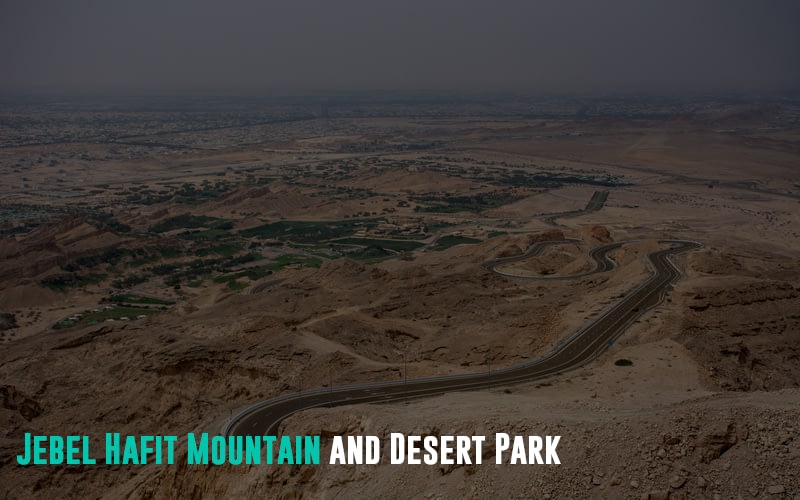
Head to the top of Jebel Hafit mountain in Al Ain for stunning sunrise and sunset views of Abu Dhabi. Rising to 1,249 meters, it is Abu Dhabi’s highest peak and the UAE’s second tallest. Accessible by car, motorbike, or bicycle, the mountain offers majestic panoramas of Al Ain.
Jebel Hafit, bordering Oman, holds significant fossil discoveries, contributing to the city’s ancient history. At its foot lies the family-friendly Jebel Hafit Desert Park, a nine-kilometer stretch with opportunities for hiking, mountain biking, and horse or camel rides. Explore archaeological remains dating back to the Neolithic period, including the 5,000-year-old Jebel Hafit Tombs, recognized by UNESCO in 2011 as part of Al Ain’s World Heritage Site. The tombs, marking the Bronze Age, contain evidence of maritime trade.
Meanwhile, preserving history and biodiversity, the park offers three camping experiences: basic, fully serviced with Bedouin tents, and luxurious bubble glamping. Guided hikes showcase the Jebel Hafit Tombs, providing a unique educational experience.
Museum of the Future
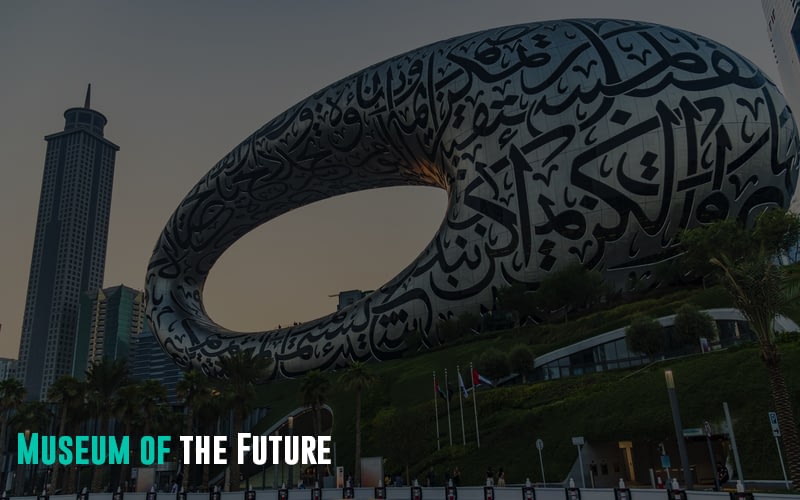
The Museum of the Future is a prominent landmark on Sheikh Zayed Road in Dubai. Launched by the Dubai Future Foundation, this ‘living museum’ explores the possibilities of the future using science and technology, embodying a blend of traditional exhibitions and immersive attractions.
Designed by architect Shaun Killa, the museum’s asymmetric torus structure clad in steel and glass is recognized by National Geographic as one of the world’s most beautiful museums. The Arabic calligraphy on the exterior, designed by Emirati artist Mattar bin Lahej, incorporates inspirational poetry by HH Sheikh Mohammed bin Rashid Al Maktoum.
The museum offers a futuristic experience through five chapters, covering topics like space exploration, augmented reality views of the future, soothing experiences in “The Oasis,” futuristic technologies, and an interactive space for children. Each floor is an interactive movie set, engaging visitors with groundbreaking technology and insights from expert storytellers.
Moreover, the museum also features a viewing deck on level two, providing close-up views of the facade and panoramic vistas of Dubai’s urban center. The Museum of the Future is a gateway to envisioning life 50 years from now, emphasizing how technology can enhance humanity and the global economy.
Downtown Dubai
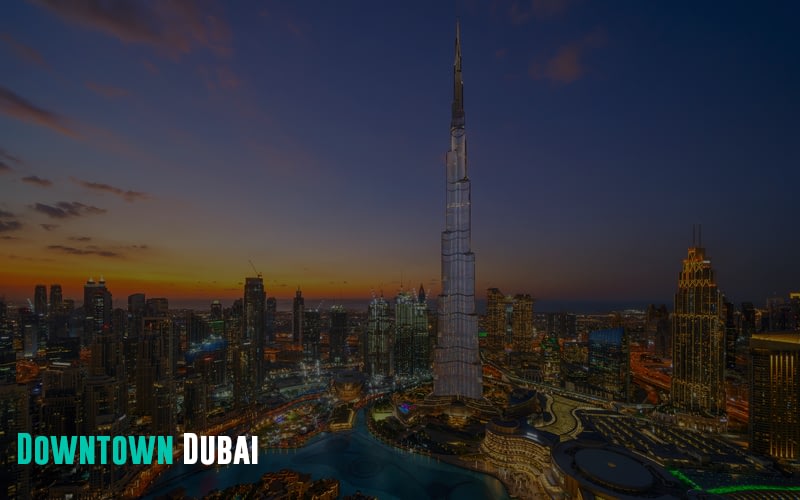
Downtown Dubai is a bustling tourism hub offering a memorable experience in the city. The Burj Khalifa is a standout attraction, offering breathtaking views from the observation deck. The Dubai Mall, the world’s largest shopping destination, provides diverse entertainment options, including the Dubai Aquarium and Underwater Zoo. The Dubai Fountain, set in Burj Lake, is the largest performing fountain, mesmerizing with light, water, and music shows. Meanwhile, the Dubai Opera hosts various performances in a distinctive dhow-shaped building.
Beyond landmarks, Downtown Dubai has become a cultural hub, integrating residential and commercial projects. Downtown Dubai also boasts top-notch dining options with panoramic views. Notable restaurants include CÉ LA VI, Fouquet’s, KRASOTA, Le Maison Ani, and Time Out Market. Thiptara in the Palace Downtown Hotel offers fountain views and excellent Thai cuisine, while Belcanto in Dubai Opera provides post-show relaxation on its rooftop lounge.
In addition, Downtown Dubai is home to high-end hotels, including Armani Hotel Dubai, Address Sky View, Address Boulevard, Address Downtown, Address Dubai Mall, and Palace Hotel. Boutique hotel options include Vida Downtown and Manzil Downtown. Four-star choices encompass Millennium Central Downtown and Ramada By Wyndham Downtown. Rove Downtown, a three-star hotel near the Zabeel extension, offers a budget-friendly option.
Yas Island
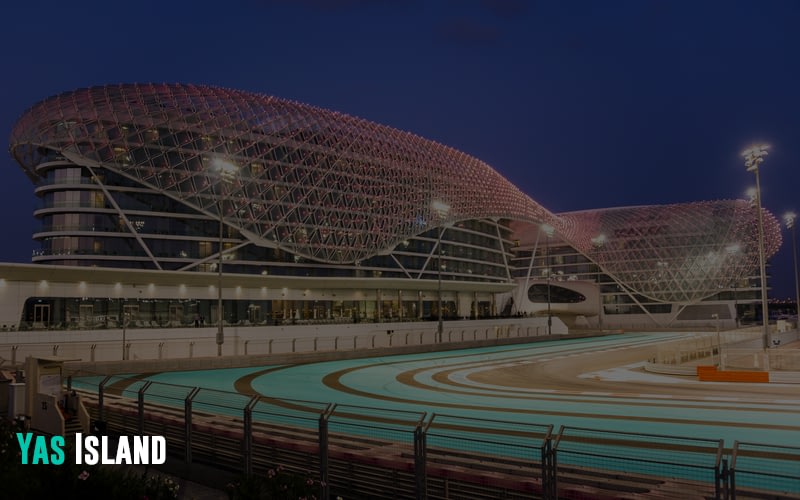
Yas Island is a premier entertainment destination in Abu Dhabi and promises an unforgettable experience. Its array of attractions is family-friendly, conveniently located 30 minutes from the city and 15 minutes from Abu Dhabi International Airport.
The island is renowned for its theme parks, such as Warner Bros. World Abu Dhabi, Ferrari World Abu Dhabi, and Yas Waterworld Abu Dhabi, offering record-breaking roller coasters and thrilling water attractions. Additionally, SeaWorld Abu Dhabi introduces visitors to a mesmerizing marine world with interactive exhibits and a vast multi-species aquarium. This paradise is home to CLYMB Abu Dhabi and the award-winning Yas Links Abu Dhabi golf course.
For racing enthusiasts, Yas Marina Circuit is home to the annual Formula 1 Etihad Airways Abu Dhabi Grand Prix. Moreover, it provides a state-of-the-art venue for track-day packages, sporting events, and go-karting at Yas Kartzone.
Desert Safari
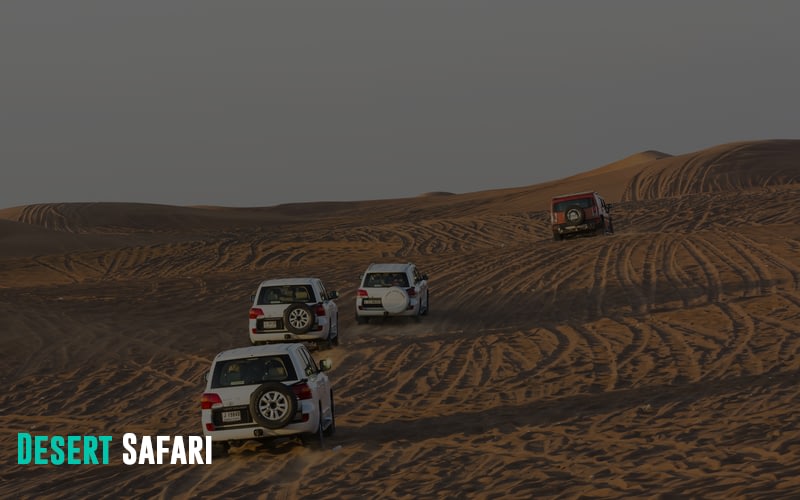
A must-do tourist attraction and activity in the UAE, desert safari offers diverse activities such as sandboarding, quad biking, dune bashing, camel riding, and camel farm visits. Visitors anywhere in the UAE can stay in desert camps with various facilities. Dubai’s desert safari is widespread, providing a thrilling 4×4 ride through the dunes. The journey typically includes a stop at a desert camp for refreshments and additional activities like camel rides, falconry, and sandboarding.
Several companies offer desert safaris in Dubai, catering to various budgets and preferences. Platinum Heritage offers luxury trips with vintage vehicles, while Arabian Adventures provides a range of safari options. It’s essential to book with reputable tour companies and avoid attempting to drive into the desert independently.
A desert safari includes a 30-45 minute drive to the desert and activities like dune bashing and sandboarding. The duration is around five to seven hours, starting early morning for sunrise or afternoon for an evening safari.
Primary Spoken Language(s)
The official language of the United Arab Emirates is Arabic. English, Chinese, French, Hindi, and Russian are the other official languages used in the courts. In addition, other widely spoken languages include Bengali, Farsi, Malayalam, Turkish, and Urdu.
Safety Concerns
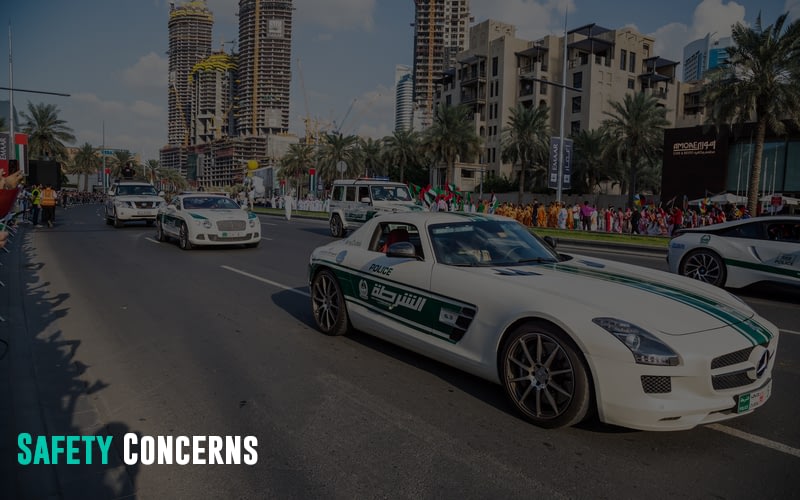
The United Arab Emirates ranks 74th out of 162 countries on the 2023 Global Peace Index. Also, UAE has a Level 2 Travel Advisory from the US Department of State. Hence, travelers in the UAE can take safety precautions when exploring the country.
The crime rate in the UAE is low. Petty theft, such as pickpocketing, occurs in Dubai but is rare. Nonetheless, exercise caution as anyone should do anywhere else.
Physical and verbal harassment and sexual assaults occur in the UAE. Hence, avoid walking alone, especially for women. Also, avoid sitting in the front seat of a taxicab, and should be sensitive when conversing with the driver.
Conflicts in the Middle East and Gulf Regions can affect the UAE. Terrorist threats to carry attacks in the Gulf Region and the UAE can become a target.
For emergencies, dial the hotline numbers 999 for police, 998 for ambulance, 997 for fire, and 996 for coastguard. Visitors can also contact 991 for electricity failure and 922 for water failure. Moreover, travelers can download and use the Abu Dhabi Police’s AD999 and the Dubai DCAS SOS apps for emergency ambulance services.
Natural Hazard
Summers in the UAE are scorching, with high humidity and temperatures sometimes reaching 50°C. Hence, be prepared by staying hydrated and avoid spending too much time outdoors. Wear lightweight and loose-fit clothing. Apply high SPF sunscreen, and wearing hats and sunglasses is essential.
Sand and dust storms are also ordinary during summer in the UAE. These can reduce visibility and trigger allergies and respiratory disorders. Therefore, stay indoors as much as possible, particularly for travelers with the risk of health problems. Keep doors and windows closed. Wear a mask over the nose and mouth, and use goggles when there’s a need to go out. Asthmatic patients should always carry their emergency reliever medications with them.
Check weather forecasts and alerts from the National Center of Meteorology when planning a trip to the UAE.
Local Laws and Customs
Breaking the laws in the UAE has severe penalties. Hence, travelers should familiarize themselves with the local laws to avoid unwanted attention. The UAE’s seven emirates have a justice system with varying rules, legal procedures, and penalties. However, they have a Federal Supreme Court and a Court of Appeal.
Alcohol in the UAE is only sold in specific areas like certain restaurants and hotels. Public drunkenness and driving under the influence are serious offenses, leading to hefty fines, jail sentences, and lashings, especially for Muslims. Notably, alcohol possession and consumption are strictly prohibited in Sharjah.
Drug offenses in the UAE carry severe penalties, including the death sentence for traffickers. Even possessing trace amounts of illegal drugs can result in lengthy prison sentences of up to 15 years.
Public decency laws are stricter, with penalties for displays of affection or immodesty. Sexual relations outside marriage are illegal, and pregnancy outside marriage can lead to arrest and detention.
Various actions, such as making rude gestures or derogatory statements, can result in arrest, fines, or deportation. Photography restrictions exist for military facilities, government buildings, sensitive sites, and diplomatic missions. It is also illegal to photograph people and their properties without permission.
Drone operation requires prior approval, and social media usage is subject to strict laws, with arrests occurring for content deemed disruptive to the UAE’s order. When posting information that may insult or challenge the local government, caution is advised.
Budget Considerations
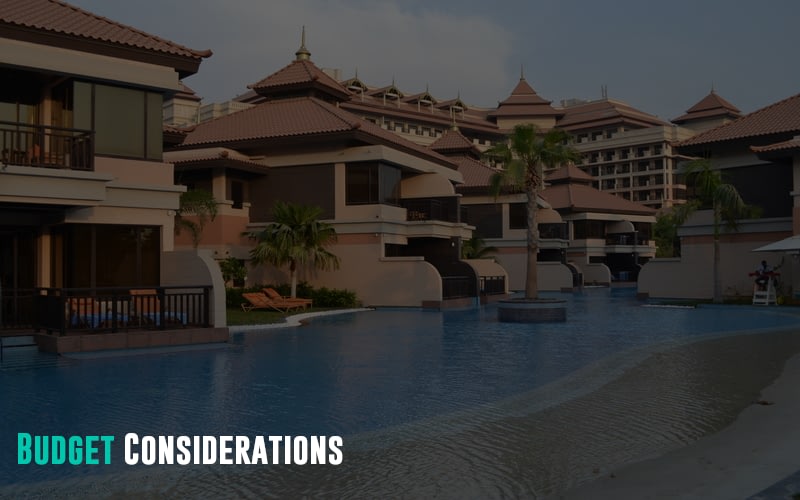
Dubai and Abu Dhabi, the most visited emirates in the UAE, are considered luxury destinations. Like anywhere else, travelers to the Emirates can blow a lot of money if they stay at luxury hotels or dine at fancy restaurants in tourist places.
Accommodations
The accommodation cost in the UAE mainly varies depending on the travel season, location, and proximity to the city center. But generally, a bed in a hostel dorm starts at $20 in Dubai and $16 in Abu Dhabi, while private hostel rooms cost around $50. Meanwhile, budget hotels can be as low as $28 during the off-season. But the price can go triple during the peak season. Free wifi is standard, and complimentary breakfast is not typical.
Airbnb rooms and homes are also widely available in the UAE. The rate ranges between $28 for a private room and $70 for an entire house or apartment. Book ahead to get the best deals.
For more comfort, travelers can stay in a three-star hotel starting from $90 and around $200 for a five-star hotel in Dubai. For as low as $100 per night, travelers can find comfort in a five-star hotel in Abu Dhabi.
Food
Foods in the UAE have Middle Eastern influences, although it has all kinds of flavors as an international dining hub. Popular dishes are shawarma, grilled kebabs, knafeh, and hummus. Everyday staples are dates and fish, with saffron, cinnamon, and turmeric as common spices.
The UAE’s food is quite expensive, with between $8.20 and $10 for fast food combo meals as the cheapest option. Meanwhile, a complete meal in a Chinese restaurant is $13.60, and $15 for an Italian meal. Expect to pay at least $28 for local specialties in a mid-range restaurant and can quadruple in Michelin and high-end restaurants in tourist areas.
For travelers who want to cook, allocate $140 weekly for groceries. It can include pasta, vegetables, meat or fish, and other basic staples.
Attractions and Transportation
Some notable attractions and destinations in the UAE are free of charge. It includes most beaches, parks, Sheikh Zayed Grand Mosque, Dubai Mall, Sharjah Museum, and the Heritage Village in Abu Dhabi. Meanwhile, admission to the iconic Burj Khalifa starts at $44, and the luxurious Burj Al Arab tour at around $82.
Depending on the location and travel distance, a single bus ticket costs $0.80 in Dubai and starts at $0.55 for a base fare in Abu Dhabi. Meanwhile, travelers can hire an economical car for $50.
Average Two-Week Cost
Budget travelers in the UAE, particularly Dubai and Abu Dhabi, can live with a $70 daily budget or $980 for two weeks. It covers the costs of a hostel dorm bed, home-cooked meals, taking public transportation, and mainly visiting free attractions.
On the other hand, mid-range travelers spend $200 daily or $2800 for two weeks. The budget includes three-star hotel accommodations, dining in mid-range restaurants, riding a taxi, visiting a few paid attractions, and taking a desert safari.
Lastly, travelers can enjoy luxury in the UAE from $400 daily to $4800 for two weeks. It includes staying in a five-star hotel, fine dining, car hire, taking domestic flights, visiting all prominent attractions, and availing all the paid tours and activities they want. So, for them, the sky is the limit for travel.
Customs And Import Restrictions
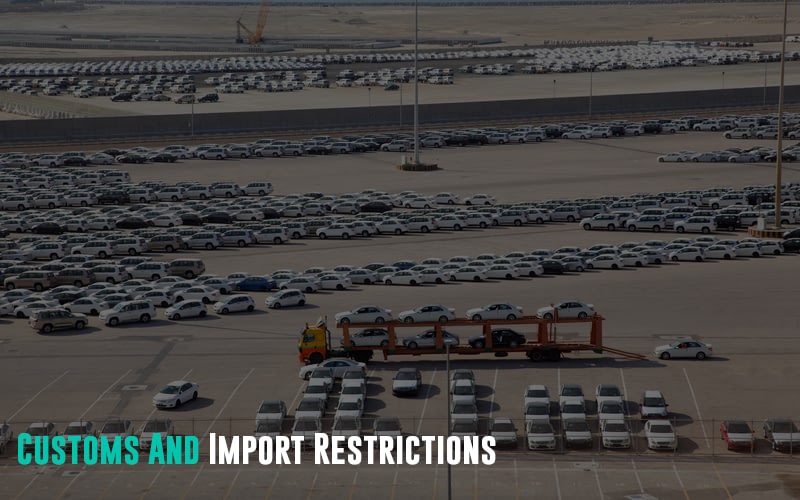
The UAE has varying customs rules for travelers entering the seven emirates. For the complete customs policies, visit the individual customs portals of Abu Dhabi, Dubai, Fujairah, Sharjah, Ajman, Umm Al Quwain, and Ras Al Khaimah.
Tax Exempt Goods
Generally, the UAE customs guidelines mostly follow the Federal Customs Authority and the GCC policies. Travelers can bring goods from abroad to the UAE without paying customs duties if they are for personal use or gifts not exceeding the following:
- Personal medications, in compliance with applicable regulations.
- Gifts whose value does not exceed AED 3000 (around $817).
- 200 cigarettes, or 50 cigars, or 500 grams of tobacco.
- Alcoholic beverages not exceeding 4 liters or 2 cartons of beer, each consisting of 24 cans not exceeding 355 ml for each can.
However, note that the alcohol and cigarette exemptions only apply to travelers over 18 years. Moreover, the emirates of Sharjah have stricter policies on alcohol and cigarette imports.
All arriving travelers to the UAE must declare to customs any cash, precious stones, and metals with a value exceeding AED 60,000 or equivalent in other currencies. Visitors can declare it to the Federal Authority for Identity, Citizenship, Customs & Ports Security (ICP) or through the official website or the Afseh app available on Google Play and App Store.
Restricted Goods
UAE Customs restricts importing certain products and requires a permit from concerned government offices. It includes the following:
- Live animals, plants, and their by-products.
- Pesticides, organic and chemical fertilizers.
- Weapons, ammunition, explosives, and fireworks.
- Medicines, drugs, and medical equipment, devices, and tools.
- Media publications and products.
- Nuclear energy products.
- Transmission and wireless devices.
- Alcoholic drinks.
- Cosmetics and personal care products.
- Electronic cigarettes and hookah.
Prohibited Goods
Travelers must not bring prohibited goods to the UAE to avoid penalties and prosecution. It includes:
- controlled/recreational drugs and narcotic substances
- pirated content
- counterfeit products and currencies
- items used in black magic, witchcraft, or sorcery
- publications and artwork that contradict or challenge Islamic teachings and values
- gambling tools and machines.
Climate Considerations
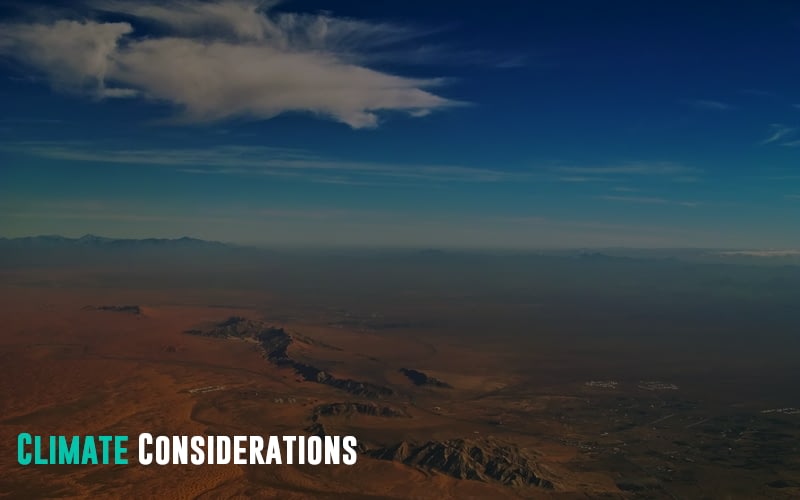
The United Arab Emirates (UAE) has a desert climate with high temperatures, low humidity, and minimal rainfall. The climate is considered arid, with mild winters and hot and humid summers. But generally, the eastern mountains have cooler weather.
Summer from May to October is scorching. The temperatures often exceed 40°C and sometimes reach 50°C in July and August. During this season, the coastal areas of Abu Dhabi and Dubai have high humidity levels as influenced by the Persian Gulf. Moreover, sandstorms often occur in the UAE during summer when strong winds can carry desert sand through the region.
In contrast, winter from November to March is more pleasant and relatively mild. The average temperature ranges between 18°C and 25°C. It is the peak tourist season in the UAE and the perfect time to explore many destinations. It is also in this season where the country receives occasional rain, particularly from December to March.
Meanwhile, the eastern mountains of Hajar have generally cooler weather due to higher elevations. Its average minimum temperatures in January and February range between 10°C and 14°C.
For weather updates, monitoring, and forecasts, visit the UAE’s National Center of Meteorology portal.
Primary Transportation Options
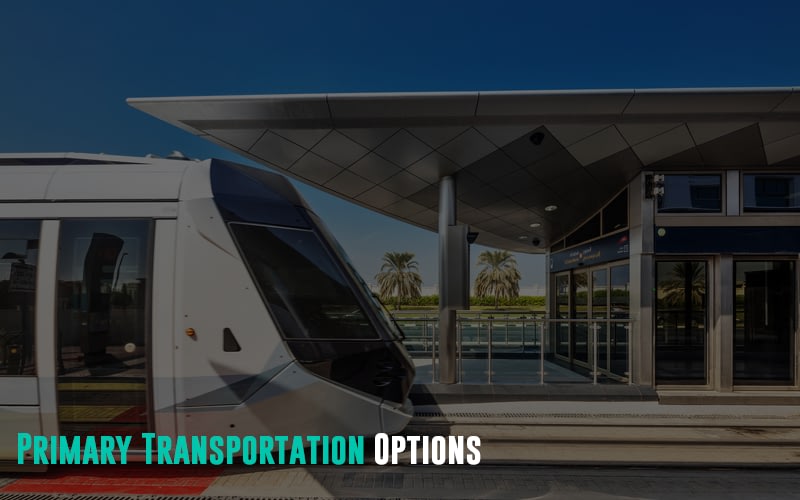
The United Arab Emirates features a modern, efficient, and continuous development of an innovative transportation network. Travelers’ options include airways, waterways, railways, and roadways.
Air
The United Arab Emirates (UAE) boasts a robust and sophisticated air transportation system, reflecting its status as a central international travel hub. Dubai International Airport is a central hub for international flights and is one of the world’s busiest airports. It is also the primary gateway to the UAE and a key transit point for travelers worldwide. Another significant airport is Abu Dhabi International Airport, the main airport in the capital. Both play a crucial role in connecting passengers to various destinations globally.
Etihad Airways is the national airline with a hub at the Abu Dhabi International Airport, while the flag carrier is Emirates Airlines, based in Dubai. Other major airline operators in the UAE are Air Arabia, Fly Dubai, and Wizz Air. Rotana Jet and Royal Jet also operate domestic flight and charter air services in the UAE.
Water
With an extensive coastline along the Arabian Gulf and the Gulf of Oman and numerous water channels, the UAE has developed a diverse network of water transportation options. It includes water taxis, water buses, ferries, and abras, transporting passengers, vehicles, and cargo. They connect some significant ports in the UAE, including the Jebel Ali Port, Port Rashid, Khalifa Port, and Zayeed Port.
The Roads and Transport Authority regulates Dubai’s water taxis, water buses, ferries, and abras. The water taxis operate between Al Mamzar and Dubai Marina via Dubai Creek, with 32 pick-up points all over Dubai. Travelers can refer to the timetable and fares for water taxis when planning a schedule in the city. Moreover, travelers can take water bus cruises around Dubai Marina, abra joy rides around Burj Khalifa and between Burdubai and Deira, or join scenic ferry rides around BurDubai, Deira, Jumeirah, and Dubai Marina. Refer to the water bus, ferry, and abras timetable for details. To travel on the waterways of Dubai, travelers need to buy and pay with a Nol card or ticket.
Ferry services for passengers and vehicles also operate daily trips between Delma Island and the mainland of Abu Dhabi (Mugharaq Port, Marsa Jabal Al Dhanna). Notably, passengers must carry a valid ID and a car registration if taking a car along to travel on the ferry.
Lastly, visitors can consider ferry services to Sharjah, between Al Ghubaiba Marine Station in Dubai and Sharjah Aquarium.
Rail
Etihad Rail, a groundbreaking UAE infrastructure project, aims to create a 1,200 km national railway network connecting cities and industrial hubs. The three-stage rail system, estimated at US$10 billion, will link key UAE cities, including Abu Dhabi, Al Ain, Dubai, Sharjah, Fujairah, Ras Al Khaimah, and Khor Fakkan. Etihad Rails expansion will also connect to ports in Dubai and borders with Saudi Arabia and Oman. While the first phase is already operational, the construction of the second phase has been halted.
Complementing Etihad Rail are the operational Dubai Metro, Dubai Tram, and the soon Abu Dhabi Metro. There are also upcoming tram systems for Sharjah and Ajman. These railway initiatives shape a comprehensive and dynamic transportation network for the UAE.
The Dubai Metro has seven zones, and each zone may contain Metro, Bus, Tram, and Water Bus stations. Journeys involve various transport modes in different zones, with charges based on the total zones passed. End-to-end trips are facilitated by transfers across modes within a 30-minute window. For instance, taking the metro and then a bus allows for a single journey charge, calculated based on the total zones passed in both trips. Using the Nol Card, fares for the Dubai Metro start at $0.80.
Car Rental
The UAE boasts the world’s best road network, ranking seventh in road quality, per the 2019 Global Competitiveness Report by the World Economic Forum. The country utilizes power-saving LED lamps along 710 km of federal roads for environmental sustainability. Hence, driving around the UAE can be a good option for travelers.
For flexibility and privacy, travelers can easily hire a car in the UAE. Aside from daily rentals, travelers in Abu Dhabi can also rent for a specific period in minutes or hours through a free-floating car-sharing service. Similarly, the Roads and Transport Authority Dubai offers a smart car rental service through which travelers can rent a car for not more than six hours. Some of the reliable operators are the Udrive and Ekar.
The rental rates are around $50 daily, depending on the car type and model. The UAE drives on the right-hand side of the road, and travelers can consider checking the Geospatial data in transportation for route planning. Some of the essential roads also worth checking are the following:
- E11 is the longest UAE road, stretching from Al Silah in Abu Dhabi to Ras Al Khaimah.
- E311, or the Sheikh Mohammed bin Zayed Road, is formerly Emirates Road, linking Dubai with other emirates.
- E611, or the Emirates Bypass Road, is a 110 km alternative route to Sheikh Zayed and Sheikh Mohammed bin Zayed roads. The road facilitates travel from the northern Emirates to Abu Dhabi without passing through downtown Dubai.
Public Transport
Public transport in the UAE is efficient and reliable. They operate according to schedule, with modern units connecting most areas within each emirate and inter-emirate.
Bus
Air-conditioned buses in the UAE connect various areas within each and inter-emirate, operating on a fixed schedule. Public buses are managed by different entities in each emirate, such as the Integrated Transport Centre and the Department of Municipalities and Transport in Abu Dhabi, Dubai Road and Transport Authority, Sharjah Road and Transport Authority, the Transport Authority in Ajman, and the RAK Transport Authority in Ras Al Khaimah.
Fares vary by the number of zones traveled, starting at $0.80 in Dubai and $0.55 for a base fare in Abu Dhabi. Meanwhile, payments need unique cards in some emirates, like the Hafilat smart card in Abu Dhabi, the Nol card in Dubai, and the Sayer card in Sharjah. Detailed schedules and fares can be obtained from the respective authorities.
Taxi
Taxis in the UAE are readily available and can be hailed from the roadside or booked in advance. Special taxis are also available for women, children, families, and people of determination. Meanwhile, booking can be done through various channels depending on the emirate, including phone calls and dedicated apps.
Taxis in Abu Dhabi can be flagged down or booked through TransAD, while Dubai Taxi Corporation provides 24/7 service, with booking available through phone calls or their DTC Smart App. Additionally, Uber and Careem offer alternative taxi ride-hailing app services in the UAE.
In Abu Dhabi, travelers can hire luxurious Mercedes-Benz Vito cars, while Dubai has limousine taxi services. Booking charges vary by emirate, taxi type, and time of day. For instance, the starting fare for a regular taxi in Abu Dhabi is $1, while in Dubai is $2.20. Passengers may incur additional charges when passing through toll gates.
Start Trip Planning
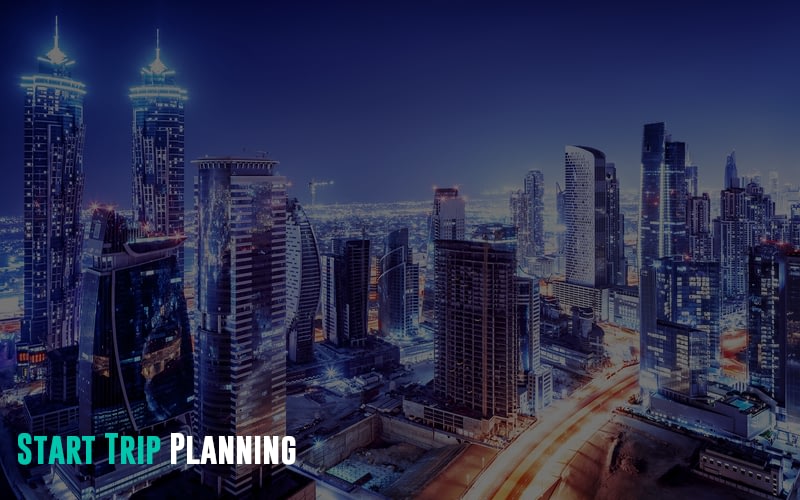
Travel-Wise is made from the ground up to help people travel more, break down the barriers that make it tough to get going, and start your journey as painlessly as possible. Bookmark our other Country Guides to help kick-start your research for future travels. We also offer templated itineraries from our staff and community that help serve as a building block for your trip plans. Alternatively, we also utilize AI to offer a way to generate itinerary ideas. This saves much time just getting you up and running with a template. From there, you can use the trip planner to create your customized itinerary, invite friends and family for collaboration, find others from Travel-Wise to join the trip, book and track important information, journal, and share your experiences at the end or along the way!

